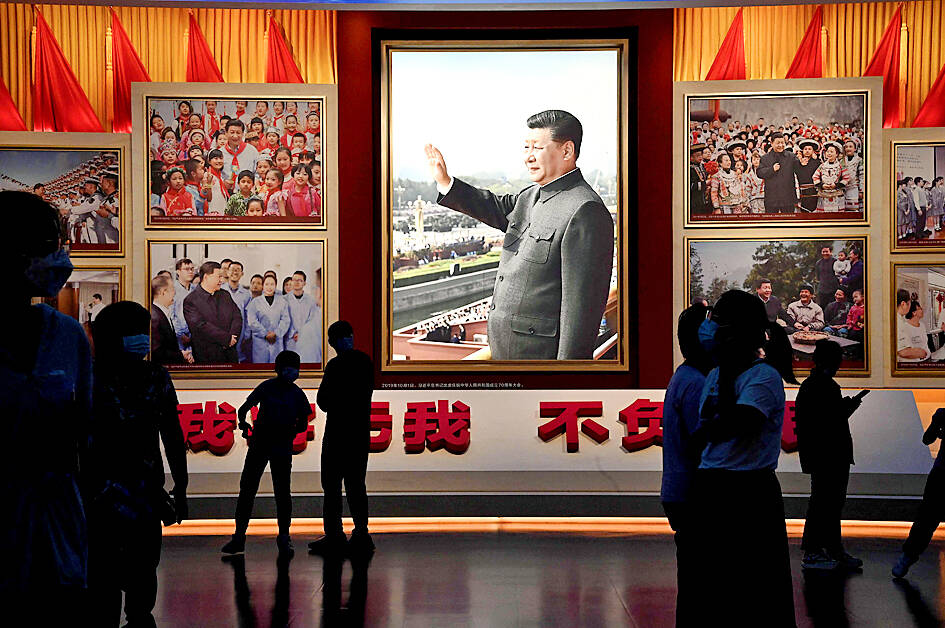Chinese President Xi Jinping (習近平) is to visit Kazakhstan next week for a state visit, Interfax reported, in what would be his first trip overseas in more than two-and-a-half years.
Xi accepted the Kazakh President Kassym-Jomart Tokayev’s invitation to visit the Central Asian nation on Wednesday next week, the Russian news agency reported, citing Kazakh Ministry of Foreign Affairs spokesman Aibek Smadiyarov.
The two leaders would sign a variety of agreements during the visit, it added.

Photo: AFP
The Chinese Ministry of Foreign Affairs did not respond to a request for comment.
The trip would mark a return to the world stage for Xi, the only G20 leader who has not traveled abroad throughout the COVID-19 pandemic. While Xi made a brief visit to Hong Kong in July, he has not set foot outside Chinese territory since January 2020.
The timing would be unusual even in pre-pandemic times. Chinese leaders rarely travel abroad in the months of intense domestic politicking before the Chinese Communist Party’s twice-a-decade National Congress, which is set to start in Beijing on Oct. 16. Xi is widely expected to secure a precedent-breaking third term at the gathering.
Yet geopolitical tensions are running high in the wake of US House of Representatives Speaker Nancy Pelosi’s trip to Taiwan last month. China responded by conducting live-fire military drills around Taiwan. Beijing has sought to gain diplomatic support for its position on Taiwan, pushing back on calls by the US and its allies to exercise restraint.
Xi might also attend a meeting of the Shanghai Cooperation Organization scheduled for Thursday and Friday next week in neighboring Uzbekistan. The group, which China sees as a counter to Western alliances, also includes Russia, India, Pakistan and other Central Asian nations.
Niva Yau (邱芷恩), a senior researcher at the OSCE Academy in Bishkek, Kyrgyzstan, said for Xi Central Asia is the “perfect pivot” for whatever is to come regarding Taiwan and any other developments in East Asia.
Another, more practical reason for selecting Kazakhstan is that it is the most important country for China to continue its Xinjiang policy, Yau added.
“If there’s any country that can make a difference regarding what China does in Xinjiang with the Turkic population there, it would be Kazakhstan,” she said.
It is also a strategic mineral source: Kazakhstan has 40 percent of the world’s uranium, which could become increasingly important as developed countries look to atomic energy as a reliable source of zero-carbon power in the coming decades.

A missing fingertip offers a clue to Mako Nishimura’s criminal past as one of Japan’s few female yakuza, but after clawing her way out of the underworld, she now spends her days helping other retired gangsters reintegrate into society. The multibillion-dollar yakuza organized crime network has long ruled over Japan’s drug rings, illicit gambling dens and sex trade. In the past few years, the empire has started to crumble as members have dwindled and laws targeting mafia are tightened. An intensifying police crackdown has shrunk yakuza forces nationwide, with their numbers dipping below 20,000 last year for the first time since records

EXTRADITION FEARS: The legislative changes come five years after a treaty was suspended in response to the territory’s crackdown on democracy advocates Exiled Hong Kong dissidents said they fear UK government plans to restart some extraditions with the territory could put them in greater danger, adding that Hong Kong authorities would use any pretext to pursue them. An amendment to UK extradition laws was passed on Tuesday. It came more than five years after the UK and several other countries suspended extradition treaties with Hong Kong in response to a government crackdown on the democracy movement and its imposition of a National Security Law. The British Home Office said that the suspension of the treaty made all extraditions with Hong Kong impossible “even if

CAUSE UNKNOWN: Weather and runway conditions were suitable for flight operations at the time of the accident, and no distress signal was sent, authorities said A cargo aircraft skidded off the runway into the sea at Hong Kong International Airport early yesterday, killing two ground crew in a patrol car, in one of the worst accidents in the airport’s 27-year history. The incident occurred at about 3:50am, when the plane is suspected to have lost control upon landing, veering off the runway and crashing through a fence, the Airport Authority Hong Kong said. The jet hit a security patrol car on the perimeter road outside the runway zone, which then fell into the water, it said in a statement. The four crew members on the plane, which

Japan’s ruling Liberal Democratic Party (LDP) and its junior partner yesterday signed a coalition deal, paving the way for Sanae Takaichi to become the nation’s first female prime minister. The 11th-hour agreement with the Japan Innovation Party (JIP) came just a day before the lower house was due to vote on Takaichi’s appointment as the fifth prime minister in as many years. If she wins, she will take office the same day. “I’m very much looking forward to working with you on efforts to make Japan’s economy stronger, and to reshape Japan as a country that can be responsible for future generations,”